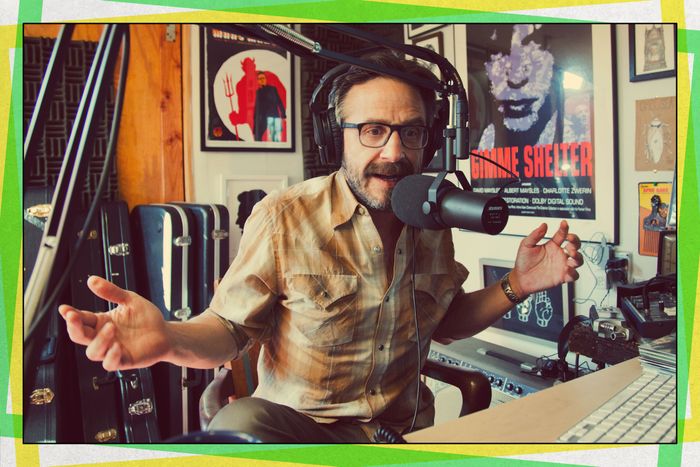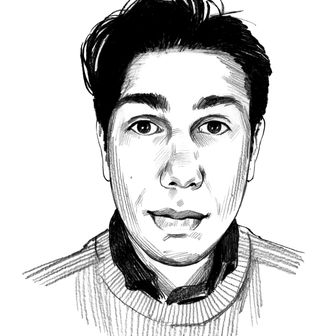
If you work any job long enough, the days eventually start to blur together. That’s true even for Marc Maron, whose job is to have engaging conversations with the most famous and interesting people on the planet. Having clocked over 1,300 episodes of his podcast WTF With Marc Maron since 2009, the comedian has stockpiled a staggering archive of thoughtful, informative, and entertaining conversations with comedians, actors, musicians, and more. It’s why, according to him, he has trouble picking favorites. “Almost all of them have moments that are completely authentic, unique, and weird,” he says. “Obama said the N-word, Todd Glass came out on the podcast, Ian McKellen did Shakespeare to my face. There’s very few where I don’t have a prolonged period of genuine engagement, and I think that’s rare.”
Maron may have a difficult time picking favorites, but fans of WTF aren’t always as troubled. There are multiple Reddit threads and articles dedicated to rounding these up. Listeners cite episodes for aficionados of specific subject matter, refreshingly candid interviews from otherwise guarded public figures, tearjerkers where guests discuss triumphs over trauma, combative interviews fans love to cringe at, and more. Regardless of why they resonate, fans can now go back and revisit their favorites at any time. With WTF+, a new podcast-subscription service available through Acast, the show’s back catalogue is accessible in its entirety, as well as new bonus content from Maron including stand-up clips, listener Q&As, exclusive interviews, movie reviews, and more. Episodes 501 and up are available on all podcast applications — Acast has made 650 previously paywalled episodes freely available for the first time in years — and all other episodes can be accessed through a subscription to WTF+.
To mark the occasion, Maron took a trip down memory lane to talk about the interviews he wants a second shot at, the unconventional locations he enjoyed recording in most, and the guests he most wanted to befriend after their interviews.
Guest you most wanted to be friends with after the interview
There is this feeling when these things go well where it feels sort of like a first date, and you think maybe you could be friends afterwards. That chemistry happens a lot, because I’m very adaptive, and I’m very locked in and interested during the time they’re there. I had that experience with Tracy Letts. I’m a big fan of his, and I appreciate him as a person and a talent. We had a really good time, and we did become friends afterwards. Also Lynn Shelton, who I became very good friends with after the podcast. We were so connected in the years later and briefly became life partners before she passed away. It happens a lot, but usually I don’t follow up on it. I feel awkward. I feel like it’s a transgression of boundaries.
Guest you most want a second shot at
There are definitely a lot of people who have been through things since I last talked to them, and a lot of comedians I talked to before they were huge. Kevin Hart and John Mulaney come to mind. I’d like to talk to Maggie Gyllenhaal again, because I did something I never do with her, where I hadn’t watched the thing she was there to promote, which she was very proud of. It was a real misstep on my part, and a lesson that I learned. There are some people like that who I could have done a little better with. But what we do is a career-spanning interview, so it would take a certain type of person, or a certain type of work to engage in the type of interview I do for an hour, if it’s just going to be about the work they’ve done since the last time we spoke. If somebody has had a second life since I interviewed them — somebody like Kevin — that might be more interesting.
Pre-interview monologue you’re proudest of
If you go back to the Michael Moore episode, we went into that responding to these attacks on Amy Schumer that were coming from, at the time, a nebulous bunch of trolls that I called “unfuckable hate nerds.” That was the beginning of when we started to see the organized movement of Gamergate, incel, anti-women trolls, who have now become part of the foundation of the Republican propaganda machine, and who have since aligned themselves with old-school white supremacists. That initiated a conversation. We’re not a fundamentally political show, but we do speak in reaction to things like that. We certainly got more political during the Trump presidency, and even last week, I addressed the Roe v. Wade repeal. There’s also the funnier ones, too. Big chunks of my stand-up material have started out as stream-of-consciousness monologues on the podcast.
Most challenging episode
There was one with Neal Brennan that he wouldn’t let me put up, because he thought that I was disrespectful to him. There’s a generation of comics my age who were contemporaries with his brother, Kevin, who knew him when he was a kid working the door at the Boston Comedy Club and saw him as just a kid. So we recorded what I thought was a pretty good episode, but he thought I wasn’t giving him the respect he deserved for who he was in the business and was still treating him like that kid that worked the door. And he was kind of right! We had to patch it up and do another episode. Then there are the ones that did go up that were fairly difficult. We thought we shouldn’t use the Billy Braver episode, because it didn’t make him look great. But he got very defensive about it. He said, “You better use it, or I’m going to have Barbra Streisand’s lawyer call you.”
Favorite live episode
There was one live episode at the Bell House where I had Artie Lange and Ira Glass on the panel, and I thought that was spectacular. I bridged the entire spectrum of radio personalities and radio entertainment. They’re representative of two extremely different types of broadcasting, both of them hugely popular, but never the two shall meet. I brought them together and sat them next to each other.
Episode where producer Brendan McDonald’s imprint is strongest
The legwork for the Obama episode was a massive undertaking. He had to work with the White House. I was on a vacation at that time. Meanwhile, he had to show up to L.A. early, deal with the Secret Service, and deal with my house. Then he had to deal with protecting me in the aftermath of having a sitting president say the N-word on my show. Because of his proficiency in the world of news and media, he was able to insulate the show and make sure we only dealt with the press outlets we wanted to deal with. I had people sitting in my driveway trying to talk to me at the time. That’s the highest level of protecting me, protecting the show, and doing what he does.
Most awkward interview moment
The one I always go back to is the one with Nick Cave. I was setting up the conversation with him, and just speaking in terms of the way he’d approached his life, I said, “You’re a real cowboy.” Except I didn’t know that that meant “gay” in Australia. It was a very awkward moment that took a lot to get back from. I’m not sure I recovered from it during that entire interview with him. It was a very awkward interview.
Most satisfying conflict to resolve
The Morgan Murphy episode was good. We had some stuff to work through, and that was a fairly candid and difficult conversation. I was able to make genuine amends for behavior. That one stands out in my head as being emotional. Then there was Lorne Michaels, who I was obsessed with. It was good to get the lowdown on something that I had carried a profound resentment about for most of my life. Lorne gave me two sittings over the course of two days to tell his story, and also enable me to process whatever my experience was with him. But more often than not, most of what I was experiencing was on my side and they didn’t really realize it. It was me carrying guilt or shame about my behavior, and it didn’t really land in the same way with the person I was talking to.
Guest’s wisdom that resonated with you most
Stewart Lee made something apparent to me as a stand-up. He’s a great stand-up from England, and he’s fairly provocative, and he has his own way of doing it that’s not for everybody. At some point, he had quit stand-up, because he felt a growing resentment towards the audiences not getting him. Then he started doing it again, and he really changed his frame of mind about people who weren’t getting him: I’m sorry that this was the wrong thing for you tonight. I’m not your guy. Seeing it that way gave me a lot of relief and it alleviated a lot of self-criticism and anger. Instead of seeing people that clearly aren’t having a good time as some sort of indictment of me, I started looking at them like, You should have done a little more research. I guess I’m not your cup of tea.
Favorite interview location outside your garage
The first Maria Bamford interview we did in a car, and there was this vitality to it: We can’t not put a new show up on Mondays and Thursdays, so we’re going to do it wherever we can. I was holding a mic, and she was holding a mic, and we were driving back from the event we had both done. Another good example was my first interview with Keith Richards. It was at the NPR Studios in New York. He was doing Morning Edition before me, and I was just gonna jump in there and use their studio to do my interview afterwards. I remember he was in there during the first interview, and some woman came running down the hall going, “He’s smoking! He’s smoking in the studio!” There was this general feeling of, Well, I guess that’s just gonna happen, isn’t it? What are you gonna do, tell Keith Richards not to smoke? It was hilarious, because it was so alien to the world we live in now: somebody smoking indoors, and at NPR of all places. I hadn’t smoked in years, and I was on nicotine lozenges to not smoke. But I was talking to Keith, and I asked him for a cigarette. I just wanted to hold it, but at some point, he threw a lighter at me, and I felt like I had to smoke. So I smoked my first cigarette in a decade with Keith Richards at the NPR Studios in New York.
More From This Series
- Hans Zimmer on His Most Unusual and Underrated Scores
- The Coolest and Craziest of TLC, According to Chilli
- Kim Deal on Her Coolest and Most Vulnerable Music


